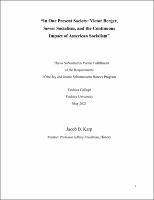Please use this identifier to cite or link to this item:
https://hdl.handle.net/20.500.12202/9485| Title: | “In our present society: Victor Berger, sewer socialism, and the continuous impact of american socialism” |
| Authors: | Freedman, Jeffrey Karp, Jacob B. |
| Keywords: | Victor Berger Socialist-Democratic Party Socialist Party of America (SPA) Milwaukee American politics |
| Issue Date: | 2023 |
| Publisher: | Yeshiva University |
| Series/Report no.: | Jay and Jeanie Schottenstein Honors Theses;2023 |
| Abstract: | While it is often asserted that socialism has never taken hold in the United States, there was at least one city in America where there was, for a brief time, a successful socialist political party. Led by Victor Berger and Emil Seidel, the Social-Democratic party of Milwaukee (SDPW) enjoyed success at the municipal level in the form of aldermen and mayors, and at the national level even won a seat in the United States Congress. Given this success, it is fair to ask a few questions. The first is why did this particular municipal party fare far better than the nationwide Socialist Party of America (SPA)? Although it is true that in the presidential election of 1912 the Eugene Debs received 6 percent, this was by far the best the Socialist party ever did, whereas in Milwaukee, Victor Berger would be elected to congress in 1922, and Milwaukee would elect a plethora of municipal officials. Secondly, what exactly did the term ‘socialism’ mean to Berger and the people of Milwaukee? It is clear that this particular brand of socialism was at odds with the dominant theory as it was derogatorily labeled “sewer socialism” by Morris Hillquit in 1932. Furthermore, Berger was often at odds with the left-wing members of the Socialist Party of America, including Eugene Debs and J.A. Wayland, a battle that often spilled over into the largest socialist paper at the time, the Appeal to Reason. Even after Berger and his wing officially joined the SPA, much like the fractures that lurked just below the surface of the supposedly united German SPD, there remained deep theoretical differences within the national party, with Berger’s faction firmly on the moderate side. Finally, in order to understand why Berger succeeded where others failed, it is also important to ask who the people living in Milwaukee were, where they came from, and what made them more inclined than the rest of the country to vote for socialist candidates. It is clear that there were three main factors that enabled the SDPW to enjoy so much success. First is the particular brand of socialism that the party, and specifically Victor Berger, preached, second the practical methods that they used to achieve their goals, and third the unique character of the citizens of Milwaukee. Through examining these three factors, it will become clear why Berger and the SDPW were able to succeed while Debs and the SPA failed. Additionally, through the investigation of the policies put forth by Berger under the aegis of socialism, it will become apparent that socialism, at least in some form, continues to exist in the politics of the United States to this very day. In doing so, the idea presented in works such as Weinsteins, The Decline of Socialism in America: 1912-1925. And Lipset’s It Didn't Happen Here: Why Socialism Failed in the United States, that the socialist movement in America fizzled out in the early 1900’s, is incorrect. Rather, when Victor Berger’s unique form of socialism is taken seriously, it becomes clear that his form of socialism has been lurking in American politics, sometimes stronger in influence and sometimes weaker, since he first advocated for it in the first decade of the 20th century. |
| Description: | Undergraduate honors program / Open access |
| URI: | https://hdl.handle.net/20.500.12202/9485 |
| Appears in Collections: | Jay and Jeanie Schottenstein Honors Student Theses |
Files in This Item:
| File | Description | Size | Format | |
|---|---|---|---|---|
| Jacob B. Karp_Honors Thesis OA.pdf | 510.28 kB | Adobe PDF |  View/Open |
This item is licensed under a Creative Commons License

